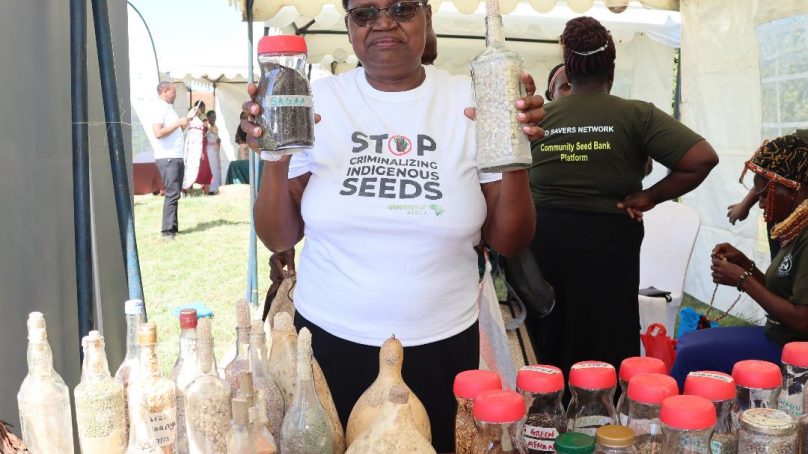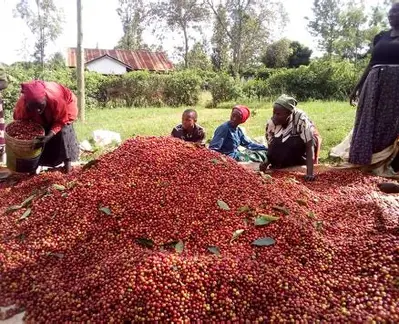
In the heart of Machakos County, Matungulu Constituency, 66-year-old Grace Mutava is not just a farmer, she’s a pioneer in the movement to preserve indigenous farming practices that date back centuries.
Through her involvement in Mwang’a Farmers Group, Mutava’s journey to rediscover traditional farming methods has not only transformed her own life but also sparked a broader movement toward sustainable agriculture in her community.
In October, Mutava travelled from Machakos to Laikipia County to participate in the Fourth Indigenous Seed and Food Harvest Fair on October 14-15 at the Governor’s Grounds to celebrate Kenya’s rich heritage of indigenous seeds, traditional foods and cultural practices.
The fair, organised by the Inter-Sectoral Forum on Agrobiodiversity and Agroecology (ISFAA) and partners, brought together farmers, policymakers and stakeholders from across Kenya’s diverse agroecological zones and beyond.
The seed fair’s theme: Collaborating to nurture indigenous seeds and foods for a better future’, resonated deeply with Mutava. Her message echoed throughout the event: Indigenous seeds are not just a part of our history; they are vital to our future.
Interviewed, Mutava shared how indigenous seeds are integral to her farming success. Her story begins in 2021 when Mwang’a Farmers Group partnered with Grow Biointensive Agriculture Centre of Kenya (G-BiACK), an organisation that champions agroecology and the use of indigenous seeds in crop farming.
For Mutava, it was an eye-opening experience. As a farmer who had long depended on commercial seeds and synthetic fertilisers, she was unaware of the long-term risks these practices posed to her health, her farm and the local biodiversity.
“I learned the importance of indigenous seeds. These are the seeds our grandparents relied on, which are naturally resilient, chemical-free, well-adapted to our soils, and full of nutrients,” says Mutava. “When I began using these seeds, I saw real change in my farming and more importantly, in my health and the health of my community.”
Before embracing agroecology, Mutava and farmers like her in the region, had used hybrid seeds, which require chemical inputs and offer little room for farmers to save their own seeds.
These commercial varieties are often vulnerable to pests, disease and changing weather patterns, and they make farmers dependent on external suppliers for new seeds each season.
But with the lessons learned from agroecology and indigenous seed-saving practices, Mutava began cultivating varieties of maize, beans, cowpeas and traditional vegetables among others, all using organic methods.
The results were transformative. Her crops thrived even in dry conditions, providing healthier, more nutritious food for her family. She discovered that indigenous seeds were not just resilient – they were the key to building long-term, sustainable agricultural systems.
“I was trained on how to grow, harvest, dry and save seeds, as well as how to exchange them with other farmers,” she says. “These lessons opened my eyes to the importance of keeping our own seed banks and reducing dependence on bought seeds that often come with chemical requirements.”
But Mutava’s story did not stop there. Inspired by her success, she began sharing her newfound knowledge with her neighbours, leading to the formation of local seed exchange networks. Word spread quickly and today, several households in Matungulu Constituency have adopted these sustainable farming practices. The ripple effect has been profound, with many farmers shifting from commercial seed reliance to embracing indigenous seed systems.
“Today, we’re not just farming. We’re advocating for seed sovereignty. We want to protect both our health and our cultural heritage,” she explains with a smile, pointing at different varieties of indigenous seed displayed on her exhibition stand.
She spoke about the challenges faced by small-scale farmers in the country, particularly the dangers of GMO seeds, which often require farmers to purchase new seeds every season and rely on chemical fertilizers and pesticides.
“Once you plant GMO seeds, you cannot save them for the next season. You must buy them again, and that cycle creates dependence,” she says. “But with indigenous seeds, we remain free. We can grow, save and share seeds year after year.”
For Mutava, this freedom is key. By reducing her reliance on commercial seed suppliers and chemical fertilisers, she not only saves money but also improves her soil health and the quality of her crops.
Article 11(3) (b) of the Constitution of Kenya 2010 provides for the right to protect the ownership of indigenous seeds and plant varieties, as well as their genetic diversity. This legal recognition affirms the crucial role that traditional farming practices and indigenous knowledge play in the country’s agricultural and cultural heritage.
In Kenya, Farmer Managed Seed Systems (FMSS) provide 80-100 per cent of seeds for smallholder farmers, who are responsible for about 70 per cent of agricultural production and 75 per cent of national food supply.
Strategic importance of indigenous seeds:
Agricultural experts and policymakers are increasingly recognising that the preservation of indigenous seeds is not just a cultural matter, it is a critical strategy for food security and climate resilience in Kenya.
According to the Agricultural Engineering Secretary at the Ministry of Agriculture, Eng Laban Kiplagat, “The preservation of indigenous seeds and traditional foods is not merely a cultural task, it is a strategic imperative for food security, climate resilience and social equity in Kenya.”
The Kenya National Agroecology Strategy for Food System Transformation 2024-2033 further echoes this sentiment, which was launched last year. The strategy envisions a future where farming practices not only improve soil health but also conserve water, enhance biodiversity and reduce the reliance on harmful chemical inputs.
Role of seed fairs and public awareness:
Seed fairs have emerged as powerful platforms to highlight the importance of conserving indigenous seeds. These fairs provide a space for farmers, researchers and the general public to share knowledge, exchange seeds and build networks that strengthen local food systems.
ISFAA Coordinator Martin Oulu stresses that seed fairs help sensitise the public on the critical need to conserve indigenous seeds while also addressing the challenges that hinder the growth of indigenous seed systems.
“Legal barriers that restrict the exchange and sale of uncertified indigenous seeds, inadequate funding for community seed banks, and low public awareness are key challenges undermining the efforts to strengthen local food systems,” Oulu says.
Laikipia Deputy Governor Reuben Kamuri, emphasises that food security begins with seed security. He explains, “We are committed to supporting indigenous food systems, promoting sustainable farming practices, and strengthening partnerships for growth.”
The county has been providing more extension officers to train farmers on agroecology and indigenous crops farming. Kamuri also notes that the focus on traditional food systems offers sustainable pathways for recovery and resilience in the face of climate change.
Legal reform and the path forward:
Advocates for indigenous seeds and farmer-managed seed systems are now pushing for a review of the Seeds and Plant Varieties Act of 2012 that currently imposes harsh penalties on farmers who share or sell uncertified seeds, with fines as high as Ksh1 million or up to two years in prison.
According to National Coordinator BIBA Kenya Anne Maina, a shift in mind-set is needed to break the cycle of seed dependency noting that we must relax prohibitive laws that penalize farmers for sharing their seeds.
Maina explains that they are awaiting a court ruling in November on whether the law, in its current form, violates constitutional rights.
“If the court rules in our favour, it will be a major breakthrough for small-scale farmers,” she says, “and could pave the way for enhanced conservation efforts for small-scale farmers who rely on indigenous seeds for food security and income, the outcome of this case could be transformative”
Harnessing technology for seed conservation:
In addition to legal reform, technology is playing a pivotal role in enhancing the viability of indigenous seed systems.
Head of Programmes EOA & KCOA Initiative at Biovision Africa Trust, Venancia Wambua highlights the potential of digitisation to support farmer-managed seed systems.
Through communication programmes, such as radio shows, magazines and databases like Infonet, farmers are gaining access to valuable information about seed saving, organic farming practices, and agroecology.
“Farmers can leverage digital tools to strengthen their seed systems and improve their practices,” Wambua explains. “Digitisation has the potential to democratize access to knowledge and resources that are crucial for seed conservation.”
Reviving traditional foods for health:
A key component of the push to protect indigenous seeds is the growing recognition of the nutritional value of traditional foods.
County Nutrition Coordinator for Laikipia Hannah Mureithi points out that traditional foods, especially those grown from indigenous seeds, can play a vital role in both preventing and treating non-communicable diseases like hypertension and diabetes.
This revival of traditional foods and seeds could be a critical step in addressing Kenya’s growing health concerns as well as ensuring the long-term sustainability of its food systems.
“Traditional foods are not just a cultural heritage; they are a source of nutrition that can help prevent and manage diseases,” Mureithi asserts. “We need to revive the consumption of these foods to promote better health outcomes.”
Path to sustainable growth:
The fight for seed sovereignty and the protection of indigenous agricultural practices is not just a health and an environmental issue; it’s a matter of national importance.
By ensuring the legal protection of indigenous seeds, embracing agroecological practices, and promoting awareness about their value, Kenya can take significant steps toward building a resilient, sustainable food system.
Mutava’s journey serves as a reminder that true sustainability lies in the hands of those who have stewarded the land for generations. “It’s not just about farming. It’s about protecting our heritage, feeding our families healthily, and caring for the land that sustains us,” says Mutava with pride.
- A Tell Media / KNA report / By Anita Omwenga







